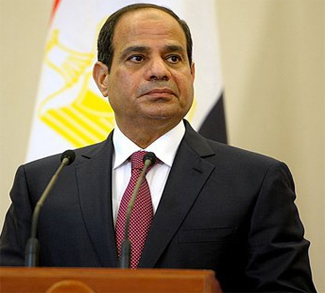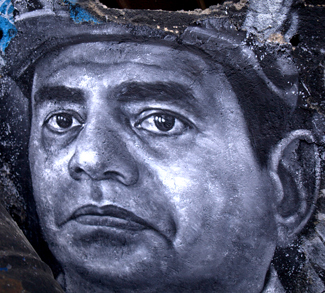Less than a month ahead of the long-awaited parliamentary elections, Egypt’s President Al-Sisi has made some remarks on the Constitution, sparking a debate about a possible amendment. Not only would this be received as bad news at a particularly bad time, but it could potentially throw the country back into a pre-2011 scenario.
Abdel-Fattah El-Sisi said a week ago that the current Constitution gave, with good intentions, broad powers to the parliament but that this is not good enough to govern a state.
Such statements, which were removed when Sisi’s address was broadcast on state television, have been read by politicians and commentators as the presidency’s intent to induce a constitutional change to limit parliamentary powers, especially in light of the cabinet’s resignation in the lead up to elections.
Last week, President Sisi accepted the resignation of Prime Minister Ibrahim Mehleb and his cabinet, and gave Petroleum Minister Sherif Ismail the task of forming a new government within a week.
Mostafa Kamel El Sayed, a political science professor at Cairo University, noted that the right to give the prime minister confidence and withdraw it from the president is the most crucial power the parliament has under the 2014 Constitution.
According to Article 161, parliament can withdraw confidence from the president and hold early presidential elections based on a request signed by a majority of the parliament and approved by two-thirds of its members.
Furthermore, Article 146 stipulates that the president has the right to appoint a prime minister, however parliament must approve any new cabinet through a vote of confidence on its proposed programme. If the prime minister and cabinet do not deliver, the president will not be able to dismiss them without the approval of the parliament.
Prof El Sayed thinks the president’s comments about the Constitution point to a clear intention to avoid giving up the powers that the charter gives to the parliament.
After all, Sisi’s administration is not keen on having a parliament that’s entitled to share its currently unchallenged legislative authority. Meaning Al-Sisi doesn’t like the Constitution, unsurprisingly.
A number of laws and decrees have been issued since the ouster of President Morsi, and Sisi doesn’t want a parliament that has the power to review all of this legislation.
Based on Article 156, in the absence of a parliament the president may issue laws, to be presented, discussed and approved within 15 days of the convening of the new parliament.
June of last year, nonetheless, Sisi vowed to respect the new Constitution which was overwhelmingly adopted in January 2014.
Yet implementation of the charter has been frozen ever since, namely with regards to civil liberties and the rule of law. Rather than commenting on how the Constitution was drafted with “good intentions,” it would be more sound to ask if it has indeed been respected over the past two years.
The presidency may have reservations over certain provisions in the text, however the charter should go into effect first. Later it can be decided if any amendment is needed.
Instead, suggesting that the Constitution needs amending now raises doubts over what was announced as the first step of a three-stage roadmap for Egypt, besides affecting Sisi’s popularity.
“Sisi’s speech sends a wrong signal since it means he would like to tighten his grip,” political scientist El Sayed said, “In this way, the president is pushing the Egyptian political system to a side.”
Abdallah Al Senawi, a journalist from the Al-Shorouk newspaper, argued that talk over an amendment to the Constitution could put in danger the stability and future of Egypt. In his view, such a move could take the country back to where it was before the 2011 revolution.
Previous constitutions failed to curb presidential powers, and even gave the president a greater deal of power. If Al-Sisi intends to amend the current one, as some are saying, the risk may be repeating the same mistakes that prior Egyptian leaders did.
Not long ago, in 2012, Mohammed Morsi released his controversial constitutional declaration granting himself the powers to issue any decision or law without any alternative authority in the country having the power to oppose or revoke it.
Back then, it was incomprehensible that a president elected in the name of the revolution granted himself every single power in the state. Now, it is as much unacceptable that the president who promised to take Egypt through a roadmap towards democracy appears anxious about ruling alongside parliament.
However, Sisi knows his popularity largely exceeds that of all the parties running for parliamentary elections, especially because there is no organized opposition, as El Sayed observed. The professor believes the president is waiting to see if there may be any opposition within the new parliament, although he has strong chances to get a majority vote. In which case, he may not have reasons to want the Constitution amended.
Regardless, if Al-Sisi has set his mind on making himself ‘omnipotent leader’ of Egypt like past presidents did, such unease with power-sharing has the potential of plunging the country into a state of uncertainty following the upcoming parliament elections.
The opinions, beliefs, and viewpoints expressed by the authors are theirs alone and don’t reflect any official position of Geopoliticalmonitor.com.




